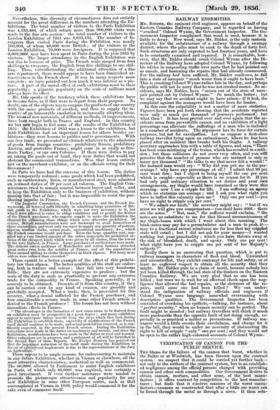RAILWAY ENORMITIES.
Ma. BIDDER, the eminent civil engineer, appears on behalf of the Eastern Counties Railway Company, and is regarded as having " crushed" Colonel Wynne, the Government Inspector. The Go- vernment Inspector- complained that wood is used, because it is liable to decay. Now wood, says Mr. Bidder, is the only materia available for the substructure of a railway through a swampy district, where the piles must be sunk to the depth of forty feet. Such structures are only expected to last fourteen years, and have to be constantly examined and repaired. It is remarkable, how- ever, that Mr. Bidder should crush Colonel Wynne after the Di- rectors of the Railwayha have adopted Colonel Wynne, by following his advice in suspending traffic over parts that he had pointed out as unsafe, and hastening the repairs that had already commenced. For the ;ailway had been suffered, Mr. Bidder confesses, to fall into a state of unrepair " much worse than it ought to have been." This is crushing Colonel Wynne rather late in the day, and perhaps the public will not be sorry that he was not crushed sooner. No ac- cidents, says Mr. Bidder, have " arisen out of the state of. mare- pair pointed out by Colonel Wynne." So much the better ;_ but we may say that no accident ought to have arisen—if it had, the complaint against the managers would have been far louder. In this case the culpability is not a matter of mere statistics. Figures have been put forth showing that the accidents reported were only so much per thousand of journeys performed : but what then ? It has been peeved over and over again that the ac- cidents arose from prevestfible causes, and no exhibition of a light percentage can alleviate the sufferings of a man who is included in a number of accidents. The argument has its force for certain purposes, but not for exculpation. Let us suppose a first-class railway ;reveller lying upon an embankment, where he has been placed after an accident that breaks both his thighs. A railway secretary approaches him with a table of figures, and says, "There has been somemistiming of the trains, which has resulted in a colli- sion ; but these collisions do not occur very often, and you will perceive that the number of persons who are maimed is only so many per thousand." " He talks to me that never felt a wound ! " the manned man would cry : " Why did you put me in the per- centage ? why have any percentage at all ? I admit that 99 per
cent went free ; but I obj i
ect to being myself the one per cent which is caught—especially as there is no reason for it. If you had only paid ordinary attention to set duties and your own arrangements, my thighs would have remained as they were this morning: now I am a cripple for life.. I am suffering an agony which no statistics can assuage ; and I ask you what right you have to inflict this calamity upon me ? Only one per cent !—you have no right to cripple any per cent." " We admit our fault," the secretary might say ; " but if we must we will give you compensation—you shall have 4001.: there are the notes." " But, man," the sufferer would exclaim, " the notes are no substitute to me for that, blessed unconsciousness of my thigh-bones with which I went about . this morning. The bank-notes may pay for a perambulator and a man to push,it- may fo a fractional extent reimburse me for loss that my crippled state will entail ; but I did not ask for your money—I wanted nothing but your punctuality ; which you have thrown away at the risk of 'bloodshed, death, and agony. Only one per cent ! what right have you to cripple one per cent of her Majesty's subj ects ?" Really there is no answering that question, which is put to railway managers in characters of flesh and blood. Unwatehed and uncontrolled, they they exhibit contempt for life and safety, or at least no sufficient respect to obtain all the security that they might. Mr. Bidder puts in- a claim of merit, because nobody has yet been killed through the bad state of the timbers on the Eastern Counties Railway. We are very glad that no one has been killed ; but were we to wait for an effectual check upon the neg- ligence that allowed the bad repairs, or the slowness of the re- pairs, until some one had been killed ? We can under- stand the indignation of railway officials and engineers if Colonel Wynne uses language somewhat overrunning with descriptive qualities. The Government Inspector has been convicted of overdoing his epithets,—talking, for instance, about "perfect security," when no human security can be perfect. The fault might be mended ; but railway travellers will think it much more pardonable than the opposite fault of not doing enough, es- pecially in so practical a matter as precautions. If railway ma- nagers would a little overdo their carefulness, and charge for it in the bill, they would be under no necessity of insinuating the right to kill or cripple " only " one per cent ; and they would not be open to the rather high-coloured accounts of Colonel Wynne.


























 Previous page
Previous page